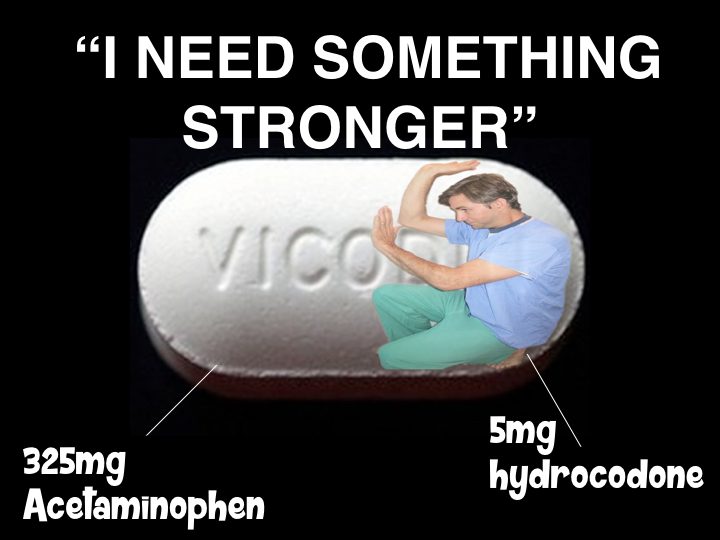Beyond opioids for dental pain
/Dental pain is hard to argue with. A rotten tooth is crazy painful and emergency clinicians want to help their patients get out of pain. But, too many of us have been trained to equate compassionate pain treatment with opioids like the omnipresent Norco (hydrocodone).
A big problem is that many clinicians and patients don't realize that 5mg of hydrocodone + 325 acetaminophen is a weak analgesic.
News Flash: Norco is not stronger than ibuprofen!
To obtain pain relief similar to ibuprofen 400-600 PO, the limited data out there suggests a best guess estimate of around 20 mgs of oral morphine or hydrocodone is needed.
Using 5mg/325mg Norco that is well over the toxic limit of 4 grams of acetaminophen per day. No surprise people overdose themselves as they predictably seek analgesic effect...not to mention if they have opioid tolerance. Truly, this is a dumb medication.
You could argue hydrocodone + NSAID may improve analgesia, but the effect is small to none, and in practice many if not most patients tend toward either taking the ibuprofen or the Norco.
Review the data on oral analgesics in acute pain yourself
"It should be noted that according to the league table opioids may be less effective for acute pain than medicines with other different mechanisms of action"
The royal college of Anesthetists; Faculty of Pain Medicine 2016
Specifically, what about dental pain?
5mg of oxycodone ( stronger than hydrocodone) was significantly less potent than 400 mgs of ibuprofen. In fact it was indistinguishable from placebo!
Full study below
No wonder dentists call us out as chumps in the NYT for overuse of opioids in dental pain.
Lets fix this....
Beyond opioids emergency treatment of dental pain
STEP I.
Dental Block with bupivicaine
(this is a no brainer )
STEP 2.
Dexamethasone 4 mg sub cutaneous near hurting tooth or 8mg IM systemic.
Dex is a very powerful anti-inflammatory and analgesic medicine. In the ED, we see it work for back pain and pharyngitis everyday. It is also a great option for dental pain working by the same mechanisms. Plenty of literature on wisdom tooth extractions to support this approach. We have no data from the ED at this point, but it is hard to develop an argument that the pain and swelling of acute dental pain in the ED should NOT respond in a similar fashion as the perioperative dental studies. The studies below are a good place to start a lit review.
Step 3. NSAIDs
Ibuprofen 400-600 mg + Acetaminophen 1000 mg Q 6 hours
Step 4. Acute dose gabapentin /pregabalin
The perioperative literature is impressive. A big dose of gabapentin/pregabalin reduces need for opioids after surgery. This definitely new to the emergency medicine world and clearly falls into the "needs further study" category. That said, at the 900-1200mg dose, you can expect to see both an anxiolytic and analgesic effect that is most pronounced in patients with chronic pain. Gabapentin is not without downsides, including abuse and addiction. I favor a single dose as part of multimodal cocktail to bridge patients to definitive dental therapy within 24 hrs.
That's it. Give it shot. Follow up with your patients and see how it works in your practice.
If you must use an opioid consider IR Morphine as your first line and avoid hydrocodone (Norco etc...)
After all this, if your patient needs an opioid for break-through pain, (for example, perhaps in the evening for pain that is preventing sleep), morphine IR 15mg PO has several advantages over the standard Norco tablet:
Not formulated with acetaminophen with the associated liver toxicity risk
Less "likeable" with slower CNS entry, less of a high and generally lower abuse potential.
Get's you out of the name brand game. Prescribing "morphine" helps raise awareness that a potent opioid is being prescribed.
Works just as well.
Reminder how-to on inferior alveolar block






